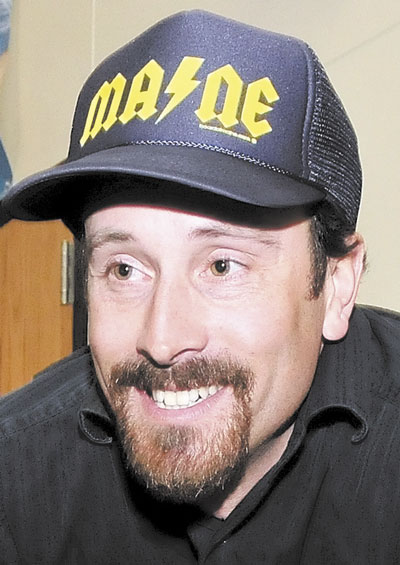Seth Wescott’s quest for a third Gold medal in the Winter Olympics has just become a little more difficult.
Wescott, the two-time gold medal winner in snowboardcross from Carrabassett Valley, suffered a knee injury on his annual trip to Alaska recently and is recovering in Utah. He had a complete reconstruction of the anterior cruciate ligament in his left knee during a surgery on April 23.
“Everything is positive,” said Wescott on Wednesday, speaking by phone from Park City, Utah, where he is rehabbing with U.S. Snowboard team physical therapists. “I hope to be ready to return to the snow in November and be ready for the qualifiers.
“This will make it a little more interesting and a little harder. But I have the time to do it.”
Wescott is regarded as the face of his sport after he won gold medals in snowboardcross in the Torino Olympics (2006) and Vancouver Olympics (2010). The Sochi Olympics in Russia are scheduled to begin with Opening Ceremonies on Feb. 7, 2014.
Wescott, 36, is confident he will be ready.
“It almost takes the stress and pressure off me,” he said. “It allows me to start at ground zero and build myself up. I know it’s going to be tight but I know it’s entirely possible. The focusing effects of what an injury can do to you can be a positive thing.”
Wescott knows a little of what he’s talking about. He had reconstructive knee surgery in 2001, on his right knee, and came back the following season with what he called “the best year of my career at that point.”
Last year, he suffered a gruesome injury during a crash, resulting in the pectoral muscle being torn from his body. He came back this year to win a World Cup race at Telluride, Colo. He finished 11th overall despite sitting out three events.
Four snowboardcross racers will qualify for the Olympics, based on results from World Cup events before the Olympics. The team may not be decided until January.
Wescott isn’t sure when he will actually compete in a World Cup race but isn’t concerned.
“In talking with the team coaches and physical therapists, we’re looking at some January races,” he said. “They’ve told me I don’t need to rush anything to go into this ?I don’t need to be ready for the first week of December. They told me to be sure I’m doing the right things to make sure I’m ready for February.”
Those who know Wescott well, like Alex Tuttle of Stratton, expect a full recovery in time for him to qualify for the Olympics. Tuttle, 22, is one of the up-and-coming snowboardcross racers in the U.S. and has a strong shot to make the Olympic team as well. He is living and training with Wescott this summer.
“It doesn’t set him back,” Tuttle said. “It just changes his game plan a lot. You know, it’s very common with athletes that some of them have their best seasons coming off injuries. It motivates them to get back to where they were earlier and often they end up gaining.
“He obviously can’t start off where he’d like to but it’s something that he can get totally under his belt before we start qualifying.”
Wescott was injured on April 14 while in Alaska with noted filmmaker Warren Miller when he fell into a crevasse. They were filming a segment for L.L. Bean — one of Wescott’s primary sponsors — on what Wescott said was a very mellow run.
But as he crested a rise, Wescott went airborne and immediately knew he was in trouble, noticing a previously-unseen crevasse directly in front of him.
“There was no way I could change my course,” he said.
Wescott slammed into the far wall of the crevasse, which was maybe six feet deep he said, with his left knee taking the brunt of the collision.
His surgery, performed nine days later, also included a patella tendon graft. He also had a tibia fracture which, he said, did not require surgery.
He has already begun rehabilitation and said he is ahead of schedule.
“It’s an aggressive time frame (for recovery) and it has to be,” Wescott said.
He plans on returning to Carrabassett Valley on May 18 where he will continue his offseasons workouts and physical therapy. He said he has been given a strict rehab schedule to follow — when he can resume golf, when he can being riding mountain bikes — and isn’t worried about not being able to qualify for the Olympics.
“I think that I’m in a unique position in that way,” he said. “I have had two pinnacle experiences at the Olympics and I’ve been incredibly fortunate to have done what I’ve already done. I guess I would be looking at it in a much different way if I hadn’t already accomplished what I’ve done in my career.
“I know what I’m looking at.”
Send questions/comments to the editors.




Success. Please wait for the page to reload. If the page does not reload within 5 seconds, please refresh the page.
Enter your email and password to access comments.
Hi, to comment on stories you must . This profile is in addition to your subscription and website login.
Already have a commenting profile? .
Invalid username/password.
Please check your email to confirm and complete your registration.
Only subscribers are eligible to post comments. Please subscribe or login first for digital access. Here’s why.
Use the form below to reset your password. When you've submitted your account email, we will send an email with a reset code.